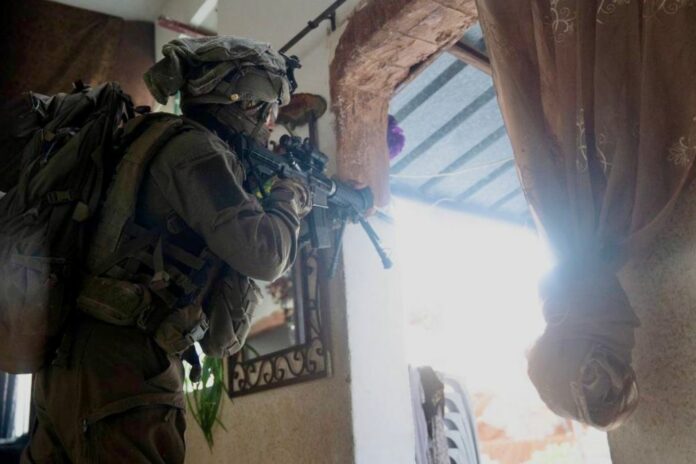Jerusalem, 3 July, 2023 (TPS) — The extensive Israel Defense Forces operation focused on Jenin is designed to reverse the trend in which this Palestinian city and parts of Samaria became a safe haven for, and hornet’s nest of, terrorism.
Hamas, with which 20% of Jenin residents are affiliated according to IDF figures, has transferred millions of shekels to Jenin terror operatives this year alone, and has dozens of operatives in the city. Palestinian Islamic Jihad, which is particularly strong in Jenin, counts 25% of the city’s population as affiliates.
Islamic Jihad has also transferred millions to operatives there. These are joined by smaller local terror factions.
The Islamic Jihad headquarters in Gaza and Syria invest significant efforts and funds in Jenin, flooding it with weapons and training, with the goal of targeting both Israeli soldiers and civilians.
Hamas and Islamic Jihad are seeking to ignite an escalation in Judea and Samaria and Jenin is their chosen flashpoint.
In addition to weapons and munitions that saturate the city, there has been an increase in the local production and use of explosives, according to the IDF.
Monday’s operation, which involves roughly a brigade-sized ground force, much of it comprising commando units, backed by air power, began with a drone strike at 1:14 a.m. on Monday on a command center located within the Jenin refugee camp used by the “Jenin Battalion.” This is the umbrella name for local terror factions that are receiving arms and backing from Hamas, Islamic Jihad, and to some degree, Iran.
In recent months, no fewer than 50 terror attacks emerged from Jenin, and 19 terrorists who conducted attacks throughout Judea and Samaria escaped to Jenin, according to IDF figures. This is how northern Samaria has become an epicenter of terrorism, leading to a succession of deadly attacks on Israeli civilians in Judea and Samaria.
The Israeli military has made it clear that its goal with the current operation is not to hold ground, but to target the capabilities of the growing terrorist threat in the city—bomb-making centers, weapons storage facilities, command posts and more, and to target terrorists themselves, both those affiliated with Islamic Jihad and Hamas and those who are not.
Three minutes after the opening airstrike, the IDF began moving its ground forces into the refugee camp. In the following hour, the IDF struck from the air an additional five times, with some of the strikes directed to open spaces to divert terrorists and allow the free movement of IDF units.
This need for air power is an illustration of just how far Jenin has descended into the clutches of the local armed factions and Islamic Jihad, and how the Palestinian Authority has lost all control there.
The need to use air power to divert hostile forces is an indication that the IDF’s freedom of movement has been eroded to a dangerous degree.
It joins the June 19 use of an Apache gunship to conduct missile strikes as part of the rescue effort to extract stranded IDF Panther armored vehicles heavily damaged by IEDs in Jenin, and the June 22 strike by an IAF Hermes 450 unmanned aerial vehicle to eliminate three gunmen in Jenin who were on their way to another shooting attack.
On June 26, Hamas claimed credit for the launch of two failed rockets from the city—a red flag about what would come next if Jenin’s “Lebanonization” process were allowed to continue.
The use of air power for the first time in this sector since 2006 is a reflection of the scale of the threat, and of the need for new tools to keep IDF units safe.
Several armed Palestinian terrorists had been killed so far on Monday morning, and the gunmen will likely seek to regroup and attack the IDF in the coming hours.
The operation is, however, ultimately a reflection of a larger strategic problem, namely the power vacuum and chaos in Samaria, which Islamist terrorists are filling effectively. Israel does not want this trend to spread south.
Ultimately, Israel has decided that it is not in its interest to seize direct control over Area A, and it certainly does not intend to allow Hamas, Islamic Jihad and other agents of Iranian influence to take over—leaving the weakened P.A. as the strategic option preferred by Israel’s defense establishment.
Yet the P.A.’s ability to reestablish a degree of control in Jenin after the latest operation is very much in question at this stage.
If it is unable to do so, Israel will need to conduct more frequent operations such as this one, to ensure that Samaria’s Lebanonization does not progress.






